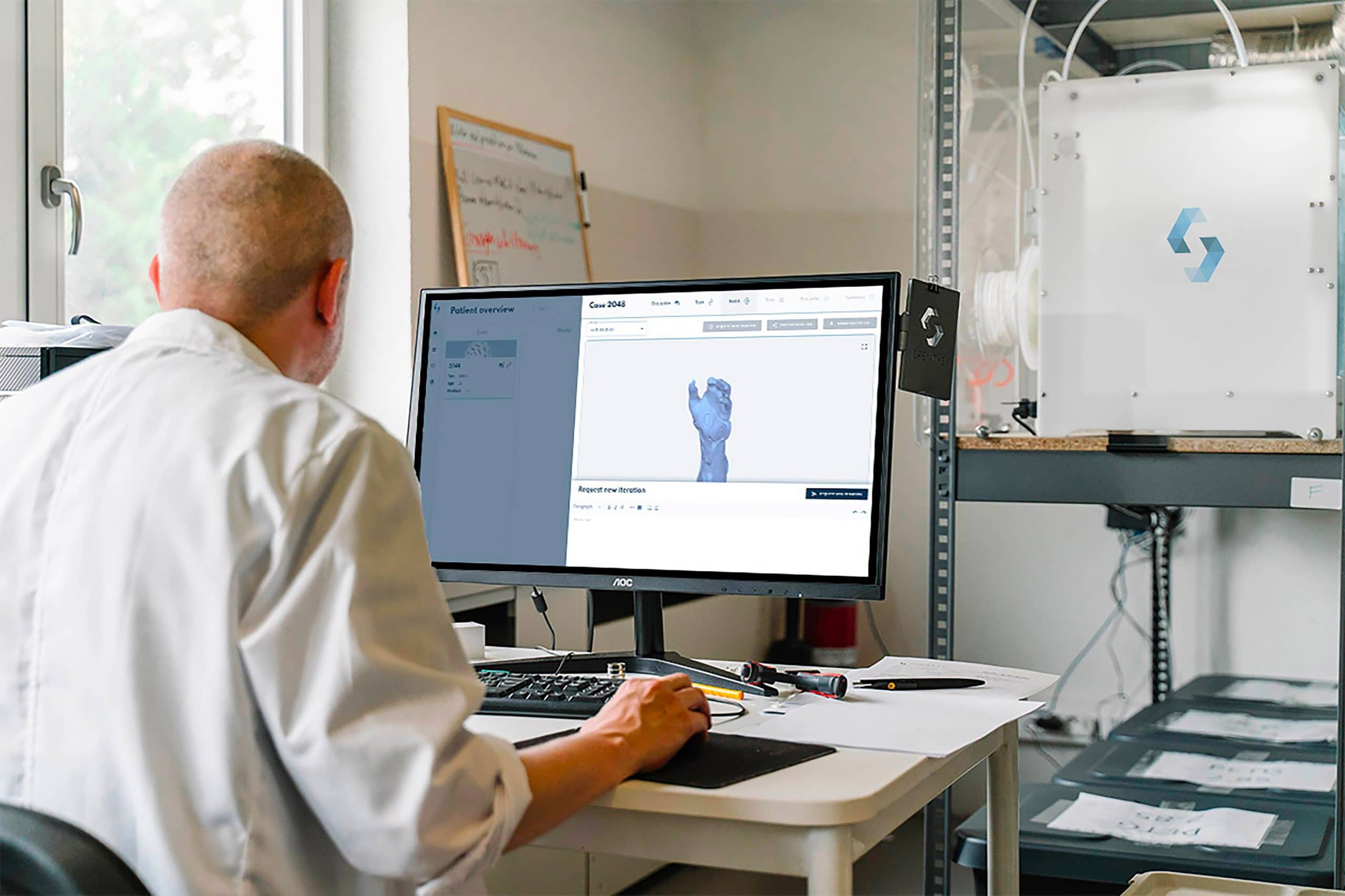

Cloud computing in healthcare: Overview and advantages
The introduction of cloud computing in healthcare is, actually, not a recent trend. MarketsAndMarkets predicts that by 2025, the market of cloud computing in the medical field will reach $65 billion with an average CAGR of 18%. The increased penetration of cloud computing into the industry can be attributed to the need for technological modernization, increased focus on digitalization, and improvement of healthcare processes.
The ongoing pandemic only exacerbates the trend. As social distancing became the new norm, the introduction of previously slow-growing areas as telemedicine has accelerated. That said, healthcare providers will continue to use these tools even after the crisis passes.
We at DICEUS have analyzed why cloud computing is so attractive for healthcare, and we are ready to share this information with you. Read further for more details.
Check out our cloud computing services.
What is cloud computing?
Cloud computing is such a model of on-demand cooperation where a vendor provides online access to configurable computing resources with minimal operating costs. In simple terms, it is the provision of IT services using a cloud infrastructure that includes servers, storage, databases, networks, and/or applications.

In most cases, the customer pays only for the capacities they actually consume. This allows for minimizing operating costs, managing infrastructure more efficiently, and scaling per business needs. But not all clouds are similar, and not every type of cloud computing is suitable for everyone. There are several models and types of cloud computing in healthcare, among which you can choose the optimal for your enterprise.
How is cloud computing used in healthcare?
Today, clouds are established and omnipresent tools. But, of course, every industry has specifics of implementation. Healthcare is a sector that has been at the forefront of many innovations. The same goes for cloud computing.
In an industry that generates significant amounts of data daily, democratizing and securing access to this information is vital. How does this happen? To answer this question, let’s start looking at the benefits of cloud computing in medicine.
Learn more about cloud-based application development
Key benefits of cloud computing in healthcare
Using cloud computing in healthcare is helpful in many areas, such as making the exchange of medical records easier and safer, automating accounting and supply operations, and simplify the creation and maintenance of telemedicine applications. The key advantages of cloud computing in healthcare are as follows:
- Increased security. Protection of customers’ personal information in online services is supported and regulated by European GDPR, the US Health Insurance Portability and Accountability Act (HIPAA), and the CSF HITRUST Alliance industry standard.
- Reduced costs. Since modern cloud computing services operate based on flexible subscription models, healthcare providers can save money on expensive systems and equipment. Additional resilience can be ensured by adopting a dedicated cloud server with guaranteed pre-established capabilities.
- Increased scalability. Cloud technologies allow increasing or decreasing the provisioned computing power depending on the current load and requirements on the fly.
- Accessible and safe document flow. Electronic health records, patient lists, test results, and other relative documents can be stored and analyzed by the service accessible from any internet-connected device, which supports a wide array of security and access rights options.
- Real-time automated analytics based on artificial intelligence routines and machine learning algorithms. With busy schedules for healthcare professionals, these capabilities can be critical for supporting large database management, clinical decision making, and treatment time shortening.
- Promoted cooperation. Using cloud-based messaging and collaboration services, healthcare providers can exchange knowledge and experience through a wide variety of methods and thus improve the quality of healthcare services and promote the development of the medical sciences.
Cloud computing in the healthcare industry enables worldwide remote access to information, automated backups, and fast recovery. In addition, most cloud service providers offer risk management and monitoring services to protect against unauthorized access.
These were the benefits of cloud computing in healthcare. Now, let us discuss risks and challenges.
Challenges of implementing cloud computing in healthcare
Major challenges of cloud computing in healthcare include user distrust of provided security and privacy, organizational inertia, loss of data governance, and poor safety standards.
In some cases, the service agreement may miss the article to allow the customer to audit and manage their data freely. Sometimes the supplier is unable to meet the required compliance codes (for example, safety standards, contracts, or policy change statements). In some cases, certain common services are unavailable to customers (for example, credit card payments).
Technical issues include resource constraints, unpredictable performance, data locks, data bottlenecks, and critical bugs in large-scale distributed cloud systems.

Due to high competition, some cloud service providers overload computing resources, may restrict access, or use outdated hardware or software. In rare cases, customers may have no access to the management of the virtual architecture of the provided service.
Data blocking is one of the most significant problems. In some cases, cloud users may decide to migrate their data or services to another provider or the on-premise IT environment. Unfortunately, most cloud infrastructures provide minimal interoperability.
Some users (for example, biomedical research laboratories) may need to frequently upload or download vast amounts of data, which may be limited by insufficient physical bandwidth. In addition, bugs in large distributed infrastructures are more difficult to debug.
The most significant risks of cloud computing in healthcare are created by open-source management interfaces, poor encryption key management, and privilege abuse. Cloud computing is usually available to many different clients. If the vendor is unable to distribute resources efficiently, this can cause security and performance issues.
In a multi-tenant environment, hardware resources are reused by other clients. In this case, a third party can gain access to the “remote” data of another client. This poses a higher risk to cloud customers than dedicated local hardware.
The use of cloud computing raises many legal issues such as local contract laws, intellectual property rights, data jurisdiction, and privacy.
DICEUS case studies: Examples of cloud computing use cases in healthcare
Medical websites and applications have long been in widespread use. For our company, the development of cloud computing applications in healthcare is one of the most active spheres of involvement. Let us provide brief descriptions of some of our works:
- Notable among the most recent cases is Appsbusinesstore’s dental clinic booking app. It provides a convenient and easy-to-use tool for confirming appointments and smart queuing. The software module created by DICEUS enabled seamless integration of all pieces of software and provided several new functionalities. Users can review doctors’ profiles and schedule or cancel a visit remotely. Norwegian customers can register using local social insurance numbers.
- The solution for ReStart Consulting, a consultancy for the integration and interoperability of healthcare and social protection systems, provides healthcare professionals with easy access to the information they need. In just six weeks, DICEUS designed a new interface with a more open and attractive look and ways to present data in more descriptive formats. This made the project easier to use and allowed users to get information faster, increasing customer loyalty and popularity of the platform.
- The Medical Errors reporting system aims to prevent the recurrence of hazardous healthcare events and improve patient safety. It provides Saudi Arabians with opportunities to file complaints against doctors for low professionalism and poor conduct, seek proper justice, and track the progress of the case. We integrated the system with the National Electronic Authentication Service and the National Health Portal using the OAuth 2.0 authorization protocol.
Users’ personal data is covered by baseline encryption to prevent unauthorized access and theft. The system supports 2FA using SMS notifications, provides information about medical institutions and practitioners. Additionally, the latter can participate in the investigation of complaints, provide feedback and conclusions. Clear logic was introduced that automates the procedure and reduces the time required to monitor a complaint from registration to trial.
- Shimmer Sensing’s Verisense wearable sensor platform reduces the length and cost of clinical trials with real-time biometrics. DICEUS cloud solution provides access to user activity and sleep data, ensures their integrity and security using R and Python code modules run on the AWS Lambda serverless computing platform.
Our team constructed the business logic needed to meet all the required data migration requirements and developed advanced features. The end solution is a combination of a fully customizable cloud platform integrated with customer data processing algorithms and linked to end devices via Wi-Fi, BLE5, and LTE.
- SaaS product for innovative weight loss company HealthyWage received an innovative cloud platform. To reorganize and increase the functionality of the project, we created a set of intelligent algorithms for the collection and real-time processing of statistical data. A web platform with dedicated client apps for Android and iOS with gamification elements allows betting on weight loss. In simple terms, you can argue and contract with a website and receive financial rewards for successful efforts or be fined per failure.
Conclusion
Healthcare as the whole is a sphere of activity that benefits a lot from modern technology. Nanotech, robotics, machine learning, optics, and other sciences contribute greatly to its development. One of such science fields is cloud computing that allows saving costs, increasing safety and security of the accumulated data, analyzing huge information arrays in real-time, and provides many other big and small benefits.
In this article, we briefly explained the meaning, discussed challenges, and provided examples of cloud computing in healthcare.
DICEUS professional team has experience of more than ten years on the market. Our cloud and app development services provide our customers with unique advantages. We make our contractors agile and mobile, enabling faster time to market, lower operating costs, and greater efficiency through rapid deployment of cloud computing and IT infrastructure.
Contact us today, and we will help you employ the full power of modern technologies to the advantage of your business!





